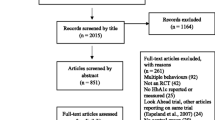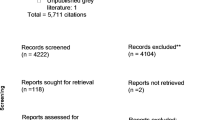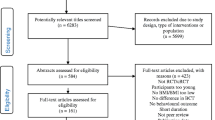Abstract
Hypertension affects a large proportion of urban African-American older adults. While there have been great strides in drug development, many older adults do not have access to such medicines or do not take them. Mindfulness-based stress reduction (MBSR) has been shown to decrease blood pressure in some populations. This has not been tested in low-income, urban African-American older adults. Therefore, the primary purpose of this pilot study was to test the feasibility and acceptability of a mindfulness-based program for low income, minority older adults provided in residence. The secondary purpose was to learn if the mindfulness-based program produced differences in blood pressure between the intervention and control groups. Participants were at least 62 years old and residents of a low-income senior residence. All participants were African-American, and one was male. Twenty participants were randomized to the mindfulness-based intervention or a social support control group of the same duration and dose. Blood pressure was measured with the Omron automatic blood pressure machine at baseline and at the end of the 8-week intervention. A multivariate regression analysis was performed on the difference in scores between baseline and post-intervention blood pressure measurements, controlling for age, education, smoking status, and anti-hypertensive medication use. Effect sizes were calculated to quantify the magnitude of the relationship between participation in the mindfulness-based intervention and the outcome variable, blood pressure. Attendance remained >80% in all 8 weeks of both the intervention and the control groups. The average systolic blood pressure decreased for both groups post-intervention. Individuals in the intervention group exhibited a 21.92-mmHg lower systolic blood pressure compared to the social support control group post-intervention and this value was statistically significant (p = 0.020). The average diastolic blood pressure decreased in the intervention group post-intervention, but increased in the social support group. Individuals in the intervention group exhibited a 16.70-mmHg lower diastolic blood pressure compared to the social support group post-intervention, and this value was statistically significant (p = 0.003). Older adults are at a time in life when a reflective, stationary intervention, delivered in residence, could be an appealing mechanism to improve blood pressure. Given our preliminary results, larger trials in this hypertensive study population are warranted.
Similar content being viewed by others
References
Mujahid MS, Diez Roux AV, Cooper RC, Shea S, Williams DR. Neighborhood stressors and race/ethnic differences in hypertension prevalence (The Multi-Ethnic Study of Atherosclerosis). Am J Hypertens. 2011; 24(2): 187–193.
Bui AL, Horwich TB, Fonarow GC. Epidemiology and risk profile of heart failure. Nat Rev Cardiol. 2011; 8: 30–41.
Lenfant C, Chobanian AV, Jones DW, Roccella EJ. Seventh report of the Joint National Committee on the Prevention, Detection, Evaluation, and Treatment of High Blood Pressure (JNC 7): resetting the hypertension sails. Hypertension. 2003; 41(6): 1178–1179.
Levine RS, Foster JE, Fullilove RE, et al. Black-white inequalities in mortality and life expectancy, 1933–1999: implications for healthy people 2010. Public Health Rep. 2001; 116(5): 474–483.
Matchim Y, Armer JM, Stewart BR. Effects of Mindfulness-Based Stress Reduction (MBSR) on health among breast cancer survivors. West J Nurs Res. 2010; 33(8): 996–1016.
Rosenzweig S, Reibel DK, Greeson JM, et al. Mindfulness-based stress reduction is associated with improved glycemic control in type 2 diabetes mellitus: a pilot study. Altern Ther Health Med. 2007; 13(5): 36–38.
Carlson LE, Speca M, Faris P, Patel KD. One year pre–post intervention follow-up of psychological, immune, endocrine and blood pressure outcomes of mindfulness-based stress reduction (MBSR) in breast and prostate cancer outpatients. Brain Behav Immun. 2007; 21(8): 1038–1049.
Kabat-Zinn J. An outpatient program in behavioral medicine for chronic pain patients based on the practice of mindfulness meditation: theoretical considerations and preliminary results. Gen Hosp Psychiatry. 1982; 4(1): 33–47.
Bohlmeijer E, Prenger R, Taal E, Cuijpers P. The effects of mindfulness-based stress reduction therapy on mental health of adults with a chronic medical disease: a meta-analysis. J Psychosom Res. 2010; 68(6): 539–544.
Chiesa A, Serretti A. Mindfulness-based stress reduction for stress management in healthy people: a review and meta-analysis. J Altern Complement Med. 2009; 15(5): 593–600.
Fang CY, Reibel DK, Longacre ML, Rosenzweig S, Campbell DE, Douglas SD. Enhanced psychosocial well-being following participation in a mindfulness-based stress reduction program is associated with increased natural killer cell activity. J Altern Complement Med. 2010; 16(5): 531–538.
Curiati JA, Bocchi E, Freire JO, et al. Meditation reduces sympathetic activation and improves the quality of life in elderly patients with optimally treated heart failure: a prospective randomized study. J Altern Complement Med. 2005; 11(3): 465–472.
Klatt MD, Buckworth J, Malarkey WB. Effects of low-dose mindfulness-based stress reduction (MBSR-ld) on working adults. Health Educ Behav. 2009; 36(3): 601–614.
Biegel GM, Brown KW, Shapiro SL, Schubert CM. Mindfulness-based stress reduction for the treatment of adolescent psychiatric outpatients: a randomized clinical trial. J Consult Clin Psychol. 2009; 77(5): 855–866.
Morone NE, Rollman BL, Moore CG, Li Q, Weiner DK. A mind–body program for older adults with chronic low back pain: results of a pilot study. Pain Med. 2009; 10(8): 1395–1407.
Birnie K, Garland SN, Carlson LE. Psychological benefits for cancer patients and their partners participating in mindfulness-based stress reduction (MBSR). Psychooncology. 2009; 19(9): 1004–1009.
Rosenzweig S, Greeson JM, Reibel DK, Green JS, Jasser SA, Beasley D. Mindfulness-based stress reduction for chronic pain conditions: variation in treatment outcomes and role of home meditation practice. J Psychosom Res. 2010; 68(1): 29–36.
Gross CR, Kreitzer MJ, Reilly-Spong M, Winbush NY, Schomaker EK, Thomas W. Mindfulness meditation training to reduce symptom distress in transplant patients: rationale, design, and experience with a recycled waitlist. Clin Trials. 2009; 6(1): 76–89.
Pradhan EK, Baumgarten M, Langenberg P, et al. Effect of Mindfulness-Based Stress Reduction in rheumatoid arthritis patients. Arthritis Rheum. 2007; 57(7): 1134–1142.
Ernst S, Welke J, Heintze C, et al. Effects of mindfulness-based stress reduction on quality of life in nursing home residents: a feasibility study. Forsch Komplementmed. 2008; 15(2): 74–81.
Cohen S, Kamarck T, Mermelstein R. A global measure of perceived stress. J Health Soc Behav. 1983; 24(4): 385–396.
White WB, Anwar YA. Evaluation of the overall efficacy of the Omron office digital blood pressure HEM-907 monitor in adults. Blood Press Monit. 2001; 6(2): 107–110.
Bellg AJ, Borrelli B, Resnick B, et al. Enhancing treatment fidelity in health behavior change studies: best practices and recommendations from the NIH Behavior Change Consortium. Health Psychol. 2004; 23(5): 443–451.
Author information
Authors and Affiliations
Corresponding author
Rights and permissions
About this article
Cite this article
Palta, P., Page, G., Piferi, R.L. et al. Evaluation of a Mindfulness-Based Intervention Program to Decrease Blood Pressure in Low-Income African-American Older Adults. J Urban Health 89, 308–316 (2012). https://doi.org/10.1007/s11524-011-9654-6
Published:
Issue Date:
DOI: https://doi.org/10.1007/s11524-011-9654-6




